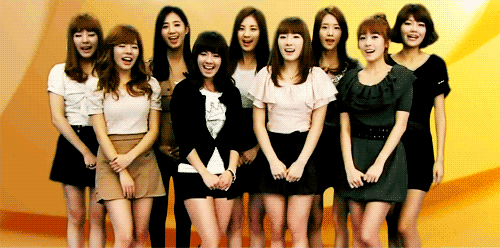As pop music continues its stranglehold on charts, hearts and wallets alike, some of the genres’ biggest artists are ones you’ve never even heard of – Girls’ Generation, 2NE1, Super Junior, Kara, SHINee, B2ST, MBLAQ,BIGBANG… They’re K-pop idols and even if you’re no longer 14 years old, it’s hard to resist the lure of K-pop’s aegyo.
The cogs and wheels of its industry have helped propel the Hallyu Wave far beyond the kitsch of J-pop. Record companies like J Tune and YG call themselves families, but they’re strictly regimented empires who keep their stars on tight leashes while overseeing everything from group formation to music production to spokesperson contracts for phones, drinks and clothing labels. K-pop isn’t just music, it’s a way of life and with the groups raking in millions off the Asia Pacific market alone, it’s also a highly lucrative one.
Behind-the-scenes, though fascinating, is dwarfed by K-pop’s public image. Idols are called idols for a reason – girls are perfect porcelain dolls and that pretty much goes for the boys as well. Long gone are the days of groups styled like a 90s parody, it’s head-to-toe high-end labels ranging from the sublime (Givenchy) to jaw-droppingly outré (Jeremy Scott), the wardrobes as extravagant as their glossy MV’s (music videos). Much like American hip hop is all about flashing the cash, so K-pop has followed suit – diamonds, gleaming sports cars and pimped-out sets are de rigueur for your average MV – even if, ironically, artists do return to cramped dorms where they live for most of their careers.
At this point, I’ll warn you that if you’ve hated every song that’s burst from the brain David Guetta, Nicky Minaj, Justin Timberlake or anything auto-tuned within an inch of its life, the likelihood of you embracing K-pop is somewhat hampered. The gleeful mash up of Euro-disco, R’n'B, hip hop and retro-pop produces glorious, OTT songs that you can’t quite sing along to but who cares that you don’t understand Korean or the snatches of English are sometimes utterly nonsensical, the sheer vitality is electrifying.
Thus far girl groups have been more successfully received outside traditional markets than the boys. Wonder Girls had their own movie on the Teen Nick channel and Girls’ Generation released their first English language single “The Boys” in the US, however, the androgynous features of the boys and their high-fashion style are struggling against the guy-next-door appeal of groups like One Direction and also that, in the main, boy bands are no longer fashionable. But the West continues to beckon for K-pop’s male idols and if it’s going to happen it’s anticipated BIGBANG will break through. Despite the controversy surrounding the group last year – G-Dragon (Kwon Ji Yong) failed a drug test and was forced into a “remorse period” while Daesung was involved in a fatal car accident that left a motorcyclist dead – and most presuming they’d split given the circumstances, they won Best Worldwide Act at the 2011 MTV EMA’s.
Having consistently pushed for control over their career beyond what’s allowed of their contemporaries, they’ve become poster boys for a different kind of K-pop, with G-Dragon, in particular, yearning for the creative freedom afforded to American musicians even as he endeavours to remain a South Korean artist. In late February 2012 they released with their fifth mini-album, ALIVE, to be supported by a 25-cities/16-countries world tour which will be closely watched to see how a group who has yet to record a song in English can succeed globally. They’re pitted against their label-mates 2NE1 – the coolest, sexiest girl group of all – who’ve had Will.I.Am produce their forthcoming record in what’s seen as a bid to reach Western audiences.
However, efforts like those of 2NE1 and Girls’ Generation are dividing fans. Long before Gaga’s “Little Monsters” or Ke$ha’s “Animals”, the likes of BIGBANG’s VIPs and MBLAQ’s A+s gave K-pop the opportunity to grow in both influence and wealth.South Korean pop is beloved because it’s South Korean, laced with all the home-grown references and reinterpreted multi-cultural influences that make it so distinctive. The big question is can it evolve to become a truly worldwide movement without being re-engineered for those wehgukin too bland and narrow-minded to appreciate K-pop in all its quirky brilliance. It’s unanswerable until the rest of 2012 plays out but by the year end you’re going to have the Hallyu Wave lapping at your feet whether you like it or not.
Key Tracks In the K-Pop Universe:
2NE1: I Am The Best, Clap Your Hands
BIGBANG: Cafe, Tonight, Beautiful Hangover
GD&T.O.P: High High, Knock Out, Baby Good Night
G-Dragon: Heartbreaker, Breathe, She’s Gone
SHINee: Lucifer, Juliette, Y.O.U
MBLAQ: Cry, Mona Lisa,
B2ST: Breath, Say No
Source: Topman Generation











Posting Komentar
Thanks 4 Comment...waiting another comment